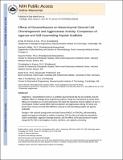Effects of Dexamethasone on Mesenchymal Stromal Cell Chondrogenesis and Aggrecanase Activity: Comparison of Agarose and Self-Assembling Peptide Scaffolds
Author(s)
Florine, Emily Marie; Miller, Rachel Elizabeth; Porter, Ryan M.; Evans, Christopher H.; Kurz, Bodo; Grodzinsky, Alan J.; ... Show more Show less
DownloadGrodzinsky_Effects of.pdf (834.8Kb)
OPEN_ACCESS_POLICY
Open Access Policy
Creative Commons Attribution-Noncommercial-Share Alike
Terms of use
Metadata
Show full item recordAbstract
Objective: Dexamethasone (Dex) is a synthetic glucocorticoid that has pro-anabolic and anticatabolic effects in cartilage tissue engineering systems, though the mechanisms by which these effects are mediated are not well understood. We tested the hypothesis that the addition of Dex to chondrogenic medium would affect matrix production and aggrecanase activity of human and bovine bone marrow stromal cells (BMSCs) cultured in self-assembling peptide and agarose hydrogels. Design: We cultured young bovine and adult human BMSCs in (RADA)[subscript 4] self-assembling peptide and agarose hydrogels in medium containing TGF-β1±Dex and analyzed extracellular matrix composition, aggrecan cleavage products, and the effects of the glucocorticoid receptor antagonist RU-486 on proteoglycan content, synthesis, and catabolic processing. Results: Dex improved proteoglycan synthesis and retention in agarose hydrogels seeded with young bovine cells but decreased proteoglycan accumulation in peptide scaffolds. These effects were mediated by the glucocorticoid receptor. Adult human BMSCs showed minimal matrix accumulation in agarose, but accumulated ~50% as much proteoglycan and collagen as young bovine BMSCs in peptide hydrogels. Dex reduced aggrecanase activity in (RADA)[subscript 4] and agarose hydrogels, as measured by anti-NITEGE Western blotting, for both bovine and human BMSC-seeded gels. Conclusions: The effects of Dex on matrix production are dependent on cell source and hydrogel identity. This is the first report of Dex reducing aggrecanase activity in a tissue engineering culture system.
Date issued
2012-08Department
Massachusetts Institute of Technology. Center for Biomedical Engineering; Massachusetts Institute of Technology. Department of Biological EngineeringJournal
Cartilage
Publisher
Sage Publications
Citation
Florine, E. M., R. E. Miller, R. M. Porter, C. H. Evans, B. Kurz, and A. J. Grodzinsky. “Effects of Dexamethasone on Mesenchymal Stromal Cell Chondrogenesis and Aggrecanase Activity: Comparison of Agarose and Self-Assembling Peptide Scaffolds.” Cartilage 4, no. 1 (January 1, 2013): 63–74.
Version: Author's final manuscript
ISSN
1947-6035
1947-6043